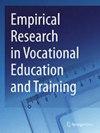Open access in vocational education and training research: results from four structured group discussions
IF 3.1
Q2 EDUCATION & EDUCATIONAL RESEARCH
Empirical Research in Vocational Education and Training
Pub Date : 2018-07-05
DOI:10.3390/publications6030029
引用次数: 4
Abstract
Aim Open Access fosters the exchange of academic research information by making publications free of charge and, wherever possible, available through open licences and without any technical barriers. Although the Open Access publication model is already well established in the natural sciences, there seems to be more resistance towards Open Access in the social sciences, including the field of vocational education and training research. The research project “Open Access in Vocational Education and Training Research” aims to uncover the conditions influencing the acceptance, dissemination and use of Open Access in vocational education and training research. The project is grounded in a sociology of knowledge approach and in media theory. It comprises of two parts. First, four structured group discussions are conducted as focus groups and analysed using a qualitative content analysis. This paper focusses on this first part of the research project, the implementation and analysis of the group discussions as well as the results thereof. The second part of the research project will be based on an online questionnaire built upon these results. The questionnaire will be sent out to authors involved in vocational education and training research in the second part of the research project. Findings The analysis of the group discussions reveals several thematic clusters. According to group discussion participants, the scope of their publications as well as transparent quality assurance procedures in publishing are particularly relevant. The reputation of their chosen publication medium is another central aspect. It also becomes clear that in some cases an information deficit regarding the financing of Open Access publications or accompanying licensing models exists. Finally, participants discuss changing literature research strategies and changes of work and reading practices. The latter being clearly discernible in an increasingly digitalised daily work routine of vocational education and training researchers, while academic research communication is also an important topic discussed.职业教育和培训研究中的开放获取:四个结构化小组讨论的结果
目的开放获取通过免费提供出版物促进学术研究信息的交流,并尽可能通过开放许可证和无任何技术障碍的方式提供出版物。尽管开放获取出版模式在自然科学领域已经确立,但在社会科学领域,包括职业教育和培训研究领域,似乎对开放获取存在更多阻力。“职业教育和培训研究中的开放获取”研究项目旨在揭示影响在职业教育和训练研究中接受、传播和使用开放获取的条件。该项目以知识社会学方法和媒体理论为基础。它由两部分组成。首先,将四个结构化的小组讨论作为焦点小组进行,并使用定性内容分析进行分析。本文重点介绍了研究项目的第一部分,小组讨论的实施和分析,以及小组讨论的结果。研究项目的第二部分将基于这些结果的在线问卷。调查问卷将发送给研究项目第二部分中参与职业教育和培训研究的作者。对小组讨论的分析揭示了几个专题组。小组讨论参与者表示,他们出版物的范围以及出版方面透明的质量保证程序尤其重要。他们选择的出版媒介的声誉是另一个核心方面。同样显而易见的是,在某些情况下,开放获取出版物或附带许可证模式的融资信息不足。最后,参与者讨论了不断变化的文献研究策略以及工作和阅读实践的变化。后者在职业教育和培训研究人员日益数字化的日常工作中清晰可见,而学术研究交流也是一个重要的讨论话题。
本文章由计算机程序翻译,如有差异,请以英文原文为准。
求助全文
约1分钟内获得全文
求助全文
来源期刊

Empirical Research in Vocational Education and Training
Social Sciences-Education
CiteScore
3.40
自引率
7.70%
发文量
9
审稿时长
13 weeks
期刊介绍:
The main focus of this journal is to provide a platform for original empirical investigations in the field of professional, vocational and technical education, comparing the effectiveness, efficiency and equity of different vocational education systems at the school, company and systemic level. The journal fills a gap in the existing literature focusing on empirically-oriented academic research and stimulating the interest in strengthening the vocational part of the educational system, both at the basic and higher education level.
 求助内容:
求助内容: 应助结果提醒方式:
应助结果提醒方式:


